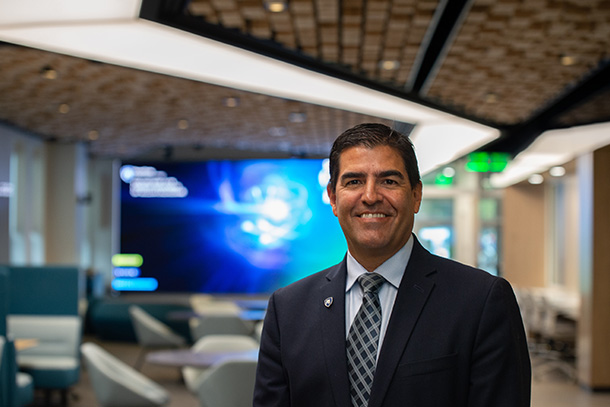
Jean Paul Allain, Huck Chair Professor and head of the Ken and Mary Alice Lindquist Department of Nuclear Engineering at Penn State, was appointed to the U.S. Department of Energy Office of Science's Fusion Energy Science Advisory Committee. Credit: Kelby Hochreither/Penn State. All Rights Reserved.
Nuclear engineer appointed to national fusion energy advisory committee
October 27, 2022
By Ashley WennersHerron
UNIVERSITY PARK, Pa. — Jean Paul Allain, Huck Chair Professor and head of the Ken and Mary Alice Lindquist Department of Nuclear Engineering in the College of Engineering at Penn State, was appointed to serve on the Fusion Energy Science Advisory Committee. The national committee provides advice and recommendations on scientific, technical and programmatic issues relating to fusion energy sciences program, overseen by the U.S. Department of Energy’s Office of Science.
“This appointment is a great recognition of Dr. Allain and his reputation in the field,” said Anthony Atchley, acting dean of the Penn State College of Engineering. “He is a renowned authority on nuclear fusion engineering and sciences who is advancing materials for adaptive fusion interfaces, functional nano- and mesoscale materials, computational modeling of fusion materials, and in-situ plasma-surface interaction diagnostics. Perhaps even more than subject area expertise, his work requires deeply innovative collaboration — a skill that will well serve the committee and those their advice benefits well.”
Reporting to Dr. Asmeret Asefaw Berhe, director of the Office of Science, the committee includes 25 experts from universities and national laboratories across the country. Allain is the only representative from Penn State, and he will serve until June 2, 2025.
The committee focuses on how to harness and optimize fusion energy — the star-fueled process that produces clean power — on Earth.
Allain, who is also the Lloyd and Dorothy Foehr Huck Chair in Plasma Medicine at Penn State, leads the Radiation Surface Science and Engineering Laboratory. He and his team aim to unify concepts from nanotechnology, nuclear engineering and materials science to yield high-fidelity control of surface and interface material properties when interacting with radiation and plasma.
“My group works to design intelligent materials with tailored properties impossible to attain any other way — the type of materials needed to contain and sustain plasma, the main component of fusion energy,” Allain said, explaining that the research focuses on material surfaces and interfaces exposed to extreme environments, from nuclear reactors to materials in space. “The fusion energy sciences program has made great strides for more than 60 years. I am honored to join this group focused on helping our understanding of plasma physics, with its wide applications in energy and exploration, leap forward.”
Allain also is an affiliate professor of biomedical engineering, an associate professor of materials science and engineering in Penn State's College of Earth and Mineral Sciences, and an Institute for Computational and Data Sciences faculty co-hire.



